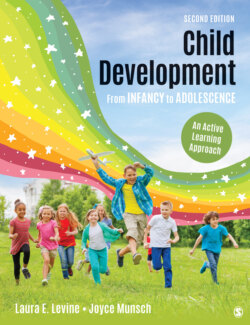Читать книгу Child Development From Infancy to Adolescence - Laura E. Levine - Страница 49
На сайте Литреса книга снята с продажи.
Understanding the Process of Development
ОглавлениеOne reason why students are interested in studying child development is to understand the role that infancy, childhood, and adolescence play in shaping who we become as adults. Researchers who study children as they develop over long periods of time have provided ample evidence that early traits, behaviors, and experiences are related to many adult outcomes. One well-known example of this is a study of gifted children begun by Lewis Terman in 1921 (Friedman & Martin, 2011). Many years later, others are still mining his data to answer questions about life span development. One finding is that those children who were rated high in the quality Terman called conscientiousness had many positive outcomes in adulthood, including living longer (Kern, Della Porta, & Friedman, 2014; Kern, Friedman, Martin, Reynolds, & Luong, 2009). How does earlier conscientiousness link with these later outcomes? The connection is partially explained by the fact that conscientious individuals were less likely to smoke and drink alcohol to excess, both of which are predictive of a shorter life span. Because the pathways between early personality characteristics and outcomes later in life are very complex, research continues to explore these connections to help us understand the process.
Conscientiousness. What long-term outcomes might result from this child’s willingness to work hard and cooperate with an adult?
Thinkstock
Saying that the earliest stages of development are important for later development and functioning does not necessarily mean they are any more important than later periods of development. Instead, development is seen as a process in which each stage lays a foundation for the stages that follow. An example of this principle comes from the research on competent parenting. Not surprisingly, receiving sensitive, competent parenting when you are an infant or young child is associated with being a sensitive, competent parent when you have your own children. However, the pathway to becoming a competent parent is also affected by social competence with peers during childhood and adolescence and later competence in romantic relationships during early adulthood (Raby et al., 2015). Although experiences early in life have consequences for functioning later in life, this research shows that experiences all along the path to adulthood contribute to an adult’s psychological functioning.
